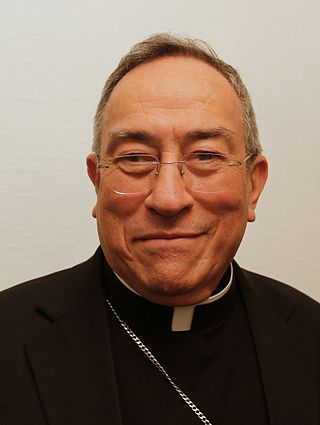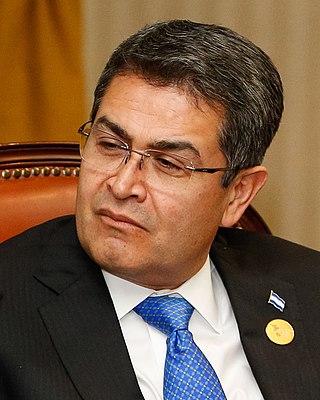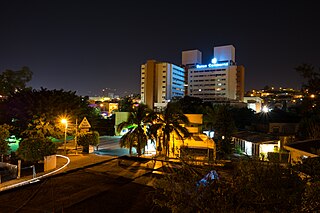This article relies largely or entirely on a single source .(August 2024) |
| |||||
| Decades: | |||||
|---|---|---|---|---|---|
| See also: | |||||
List of events in the year 2015 in Honduras .
This article relies largely or entirely on a single source .(August 2024) |
| |||||
| Decades: | |||||
|---|---|---|---|---|---|
| See also: | |||||
List of events in the year 2015 in Honduras .

Central America is a subregion of North America. Its political boundaries are defined as bordering the United States and the Gulf of Mexico to the north, Colombia to the southeast, the Caribbean Sea and the Gulf of Mexico to the east, and the Pacific Ocean to the southwest. Central America is usually defined as consisting of eight countries: Belize, Costa Rica, El Salvador, Guatemala, Honduras, Nicaragua, Mexico, and Panama. Within Central America is the Mesoamerican biodiversity hotspot, which extends from southern Mexico to southeastern Panama. Due to the presence of several active geologic faults and the Central America Volcanic Arc, there is a high amount of seismic activity in the region, such as volcanic eruptions and earthquakes, which has resulted in death, injury, and property damage.

Honduras, officially the Republic of Honduras, is a country in Central America. It is bordered to the west by Guatemala, to the southwest by El Salvador, to the southeast by Nicaragua, to the south by the Pacific Ocean at the Gulf of Fonseca, and to the north by the Gulf of Honduras, a large inlet of the Caribbean Sea. Its capital and largest city is Tegucigalpa.

Politics of Honduras takes place in a framework of a multi-party system presidential representative democratic republic. The President of Honduras is both head of state and head of government. Executive power is exercised by the government. Legislative power is vested in the National Congress of Honduras. The party system is dominated by the conservative National Party of Honduras, the Liberal Party of Honduras, and Liberty and Refoundation.
The Football War, also known as the Soccer War or the 100 Hour War, was a brief military conflict fought between El Salvador and Honduras in 1969. Existing tensions between the two countries coincided with rioting during a 1970 FIFA World Cup qualifier. The war began on 14 July 1969 when the Salvadoran military launched an attack against Honduras. The Organization of American States (OAS) negotiated a cease-fire on the night of 18 July, hence its nickname. Salvadoran troops were withdrawn in early August.

Carlos Roberto Reina Idiáquez was a Honduran politician, lawyer and diplomat who served as the President of Honduras from 1994 to 1998. He was a member of the Honduran Liberal Party.

La Ceiba is a municipality, the capital of the Honduran department of Atlántida and a port city on the northern coast of Honduras in Central America. It is located on the southern edge of the Caribbean, forming part of the south eastern boundary of the Gulf of Honduras. With an estimated population of 209,000 living in approximately 170 residential areas, it is the fourth most populous and third most important city in the country.

Porfirio Lobo Sosa also known by his nickname, Pepe Lobo, is a former Honduran politician and agricultural landowner who served as President of Honduras from 2010 to 2014. A member of the conservative National Party and a former deputy in the National Congress of Honduras from 1990, he was president of the National Congress of Honduras from 2002 to 2006. He came second to Manuel Zelaya with 46% of the vote in the 2005 general election. After the military ousted Zelaya in a coup d'état, Lobo was elected president in the 2009 presidential election and took office on 27 January 2010.

The National Congress is the legislative branch of the government of Honduras.

The National Party of Honduras is a conservative political party in Honduras founded on 27 February 1902, by Manuel Bonilla Chirinos. Historically it has been one of the two most influential parties in the country. The party's platform is based on Christian humanist doctrine, and its five main principles are common wealth, dignity of the human person, equality, solidarity and subsidiarity.

Óscar Andrés Rodríguez Maradiaga, S.D.B. is a Honduran prelate of the Catholic Church who was Archbishop of Tegucigalpa from 1993 to 2023. He was president of Caritas Internationalis and served as president of the Latin American Episcopal Conference (CELAM) from 1995 to 1999.

José Manuel Zelaya Rosales is a Honduran politician who was President of Honduras from 27 January 2006 until his forcible removal in the 2009 coup d'état, and who since January 2022 serves as the first First Gentleman of Honduras. He is the eldest son of a wealthy businessman, and inherited his father's nickname "Mel". Before entering politics he was involved in his family's logging and timber businesses.

The Francisco Morazán Stadium is one of the three stadiums available to the city of San Pedro Sula, Honduras. It is an official stadium for games of the National League of Professional Football in Honduras and international matches and international competitions of the Confederation of North, Central America, and Caribbean Association Football (CONCACAF) and FIFA.

Association football in Honduras is a national sport. It is the most popular sport among Hondurans, becoming popular in the 20th century. Honduras performed memorably in three World Cups, Spain 1982, South Africa 2010, and Brazil 2014. The nation also competes in the Copa America, UNCAF Nations Cup, Olympic Games, and in FIFA U-20 World Cups. Its national team team is considered the strongest football team in central America alongside Costa Rica.

Iris Xiomara Castro Sarmiento, also known as Xiomara Castro de Zelaya, is a Honduran politician who has served as the 56th president of Honduras since January 2022. She is the country's first female president, and served as first lady during the presidency of her husband Manuel Zelaya.

In political science, the term banana republic describes a politically and economically unstable country with an economy dependent upon the export of natural resources. In 1904, American author O. Henry coined the term to describe Guatemala and Honduras under economic exploitation by U.S. corporations, such as the United Fruit Company. Typically, a banana republic has a society of extremely stratified social classes, usually a large impoverished working class and a ruling class plutocracy, composed of the business, political, and military elites. The ruling class controls the primary sector of the economy by way of exploitation of labour. Therefore, the term banana republic is a pejorative descriptor for a servile oligarchy that abets and supports, for kickbacks, the exploitation of large-scale plantation agriculture, especially banana cultivation.

Juan Orlando Hernández Alvarado, also known by his initials JOH, is a Honduran lawyer, politician and convicted drug trafficker who was president of Honduras from 2014 to 2022 for two consecutive terms.

Tegucigalpa —formally Tegucigalpa, Municipality of the Central District, and colloquially referred to as Tegus or Teguz—is the capital and largest city of Honduras along with its sister city, Comayagüela.

Julieta Castellanos is a Honduran sociologist and the dean of the National Autonomous University of Honduras (UNAH) since 2009. Castellanos is known for campaigning against violence in Honduras, focusing on both drug cartels and police corruption. She has advocated for both judicial and police reform. Castellanos founded the Observatorio de la Violencia at UNAH in 2004, a center that analyzes crime statistics in Honduras. She was also a member of the Truth and Reconciliation Commission, which was tasked with clarifying the facts related to the 2009 coup that ousted President Manuel Zelaya.

Honduras–India relations refers to the international relations that exist between Honduras and India. The Ambassador of India in Guatemala City is concurrently accredited to Honduras. India also maintains an Honorary Consul General in Tegucigalpa. Honduras is accredited to India from its embassy in Kuwait City.
The COVID-19 pandemic in Honduras was a part of the worldwide pandemic of coronavirus disease 2019 caused by severe acute respiratory syndrome coronavirus 2. The virus was first confirmed to have spread to Honduras on 10 March 2020, when two women tested positive for the virus after one of them landed on Toncontín International Airport in a flight from Madrid, Spain, and the other on Ramón Villeda Morales International Airport in a flight from Geneva, Switzerland. Confirmed cases have been reported in all 18 departments of the country, with the majority of cases located in Cortés and Francisco Morazán.